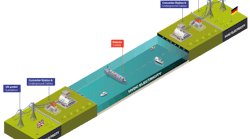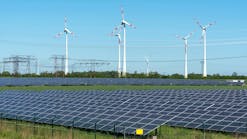UK and Germany Partner To Enhance Renewable Energy and Strengthen Energy Security
The UK and German governments have partnered to help secure safe, affordable and clean energy for consumers in both nations for the long term and strengthen energy security.
While both the governments have confirmed their targets and commitment toward net zero and energy transition, they have also doubled down on assurances made under the Paris Agreement to limit global warming to 1.5 degrees.
The partnership will allow both countries to enhance cooperation in renewables, notably offshore wind and electricity interconnection, to remove regulatory barriers and accelerate deployment of offshore hybrid projects; share industry knowledge and expertise to improve the exploration of carbon capture, utilization and storage, including the cross-border transport of CO2; strengthen and promote regional and global energy security, including discussions on winter preparedness, security of infrastructure and supply chains and share best practices and lessons learned on industrial, buildings and heat decarbonization, energy efficiency and net zero policies and strategies.
“We are already working together in the North Sea to deliver our offshore wind ambitions, as well as linking our countries with subsea electricity cables,” said Energy Security Secretary, Claire Coutinho.
The energy and climate partnership includes the UK-Germany hydrogen partnership signed by Lord Callanan in September to accelerate the role of low carbon hydrogen from renewable sources in both nations’ energy mix to achieve the global hydrogen economy.
British and German companies are collaborating on joint projects in the North Sea and both countries aim to maximize their renewables potential.
Around 75% of installed offshore wind capacity in the North Sea is in German and British waters, which will enable UK to achieve up to 50 GW of offshore wind, including up to 5 GW of floating offshore wind by 2030, while Germany aims to install 30 GW by 2030.
The $2.95 billion NeuConnect project, a subsea electricity cable between the UK and Germany, is expected to power up to 1.5 million homes in the UK and Germany with clean energy over its lifetime, once operational in 2028. The electricity power line with approximately 725 km of land and subsea cables connects Kent and Wilhelmshaven.
Another interconnector project connecting the UK to Germany is under development and awaiting regulatory approval from Ofgem.
“Clean power generation is front-and-center of the UK’s strategy to reach net zero by 2050,” said Beverley Cornaby, Director, Policy and Systems Change Collaborations, Cambridge Institute for Sustainability Leadership. “This partnership will support these aims by providing a blueprint on energy and climate between Europe’s 2 largest economies – helping the UK and Germany to bolster cooperation, remove regulatory barriers on renewables and share knowledge on industrial decarbonization.”


